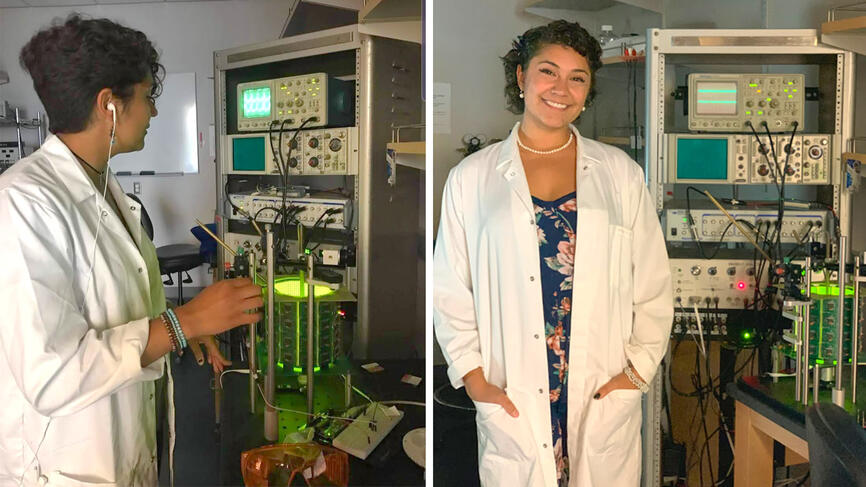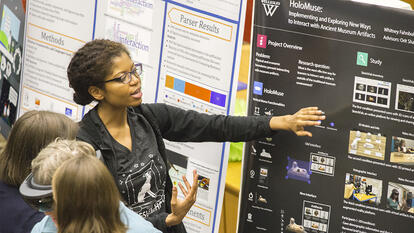Class of 2020 Jazz Musician Will Pursue Neuroscience PhD, Explore Connections Between Music and the Brain
When Rachel Frazer ’20 was 14 years old, her grandfather, a jazz trumpet player, bought her her first French horn. Neither of them knew at the time how much it would shape Frazer’s future.
Though Frazer grew up listening to jazz, she primarily played classical music herself. “When I was younger, I never connected to it,” Frazer said. “The demographics of the people who seemed to care about jazz were older white men—and I didn’t associate it with myself.”
That would all change when she got to Wellesley.
Da Capo (from the beginning)
Frazer first visited campus as part of the Discover Wellesley Weekend and attended a class with her hostess on how music makes us feel, taught by Jenny Olivia Johnson, associate professor of music (she would later become Frazer’s first-year adviser). That’s when she had the first inkling that at Wellesley, she could explore both her passions: music and neuroscience.
At Wellesley, faculty helped her see that she could major in music while still getting the experience she needed to pursue graduate work in neuroscience. She took her first neuroscience class with Sara Wasserman ’02, Kresa Family Assistant Professor of Neuroscience, and learned that she had been a theater studies major at Wellesley. “She showed me that it is possible to do this,” Frazer said, “that as long as you take the right classes, and get research experience, you can pursue grad school even if you don’t have the major.” Starting in the summer of 2018, Frazer began researching fruit flies in Wasserman’s lab—work she will continue virtually this summer as well.
While learning about world music in classes with Johnson and K.E. Goldschmitt, assistant professor of music, Frazer joined the Wellesley BlueJazz Ensembles (as the group’s first French horn player), where she said she found her family on campus and developed her love of the genre.

Every spring, a jazz musician is invited to campus to work with the band. Frazer’s sophomore year, the Grammy-winning Brazilian artist Luciana Souza set her on a course to connect with her Latin American roots.
“It was the first time I really got to interact in person with someone who looked like me—with brown skin and curly hair—who was doing jazz beautifully,” said Frazer. “It made me realize that jazz should be for everybody, and that there is a history of exclusion of people of color and women in jazz history, even today—even though that music was created by people of color in the first place.”
Souza connected Frazer with Danilo Pérez and his wife, Patricia Zárate-Pérez, who founded Berklee College of Music’s Global Jazz Institute and the annual Panama Jazz Festival together. Frazer’s father is from Panama, and she has always dreamt of traveling there. When Pérez, Panamanian himself, learned this he said, “So we’re family!” He helped her get a volunteer job at the weeklong festival in January 2019 and 2020, and study it as part of her thesis.
Panama
Frazer volunteered for two years in a row at the festival (most recently as a Daniels Fellow), and learned about Pérez’s foundation and the free music programming it offers to the community in Panama City. She explored music’s power to heal individuals and low-income, at-risk communities by offering an alternative to, and potential treatment for, involvement in gang-related violence, crime, and drug use. She also volunteered at the festival’s music therapy symposium, which brings people from all over the world to talk about music and healing, and music and the brain.
Frazer noticed, however, that something was missing. “There is unfortunately a large disparity in the number of women and young girls who are involved in these education programs, which I believe to be a part of a larger issue in both the Latinx community and the jazz community,” Frazer said in a video of her thesis abstract submitted for Wellesley’s annual Ruhlman Conference. This means that few female musicians pursue jazz, and those who do are less likely to play in jazz ensembles.
In her thesis, an intersectional analysis of the festival that incorporates medical ethnomusicology, feminist ethnography, and jazz studies, Frazer explores the ways women are excluded from these communities, and she shares the stories of those involved in the festival and local music education in Panama. Using the festival as a case study, she also looks at the unique ways jazz can facilitate and promote the healing process, and the connections between social justice and music.
“The goal in the future is to combine the two—music and neuroscience—and have my own lab... to see what happens to the brain when you’re listening to music, so that we can use music as a mechanism for healing ailments of the brain.”
Rachel Frazer ’20
“Wellesley gave me the strength and made me feel free to talk about this without feeling shy or nervous that people wouldn’t receive what I had to say,” Frazer said. “Especially when it comes to healing, to criticize an aspect of what the festival and foundation were doing was scary. As great as their efforts are, I felt these issues needed to be raised. My relationships and experience at Wellesley gave me the framework to do that.”
Beyond Wellesley
The summer before her senior year, Frazer was accepted to the McNair Scholars program at Wellesley. Led by Cammi Valdez, the program helps students from low-income, first-generation, and historically underrepresented groups prepare for and enter doctoral study. Frazer learned how to navigate the graduate school application process, drafting statements of purpose and practicing interviews with her fellow scholars, and how to apply for grants and fellowships.
“The program has also been wonderful because I was connected with so many Wellesley students who were people of color and doing science like me,” Frazer said. “Normally, I would hang out with my jazz friends, but I was also taking premed classes and working with flies under a microscope all the time. It can be hard to talk about that with the same people you make music with. Being able to talk about research and our futures in science with others broadened my community at the College.”
When the group of Wellesley McNair scholars attended the Annual Biomedical Research Conference for Minority Students together in December 2019, Frazer’s world expanded again. Over 500 students of color from colleges and universities across the country presented their research and projects. She made an early connection with a representative from the neuroscience program at Columbia University; she will be heading there in the fall to pursue her PhD.
Frazer is looking forward to working with the Zuckerman Institute at Columbia, which has a jazz artist in residence program and frequently holds symposia and programs that explore the connections between music and the brain. “I want to focus early on at Columbia on developing a really strong foundation in neuro,” Frazer said. “The goal in the future is to combine the two—music and neuroscience—and have my own lab that investigates these topics with techniques like MRI to see what happens to the brain when you’re listening to music, so that we can use music as a mechanism for healing ailments of the brain.”
For now, Frazer is back in her hometown of San Antonio, Texas. The unexpected time at home has given her a chance to connect with her grandfather. “We haven’t had many deep conversations before,” she said, “but I talked with him about education and how important it is to me, and how I want to be a professor someday. We have these shared interests beyond jazz now; he was a music teacher, and we both realize how impactful music can be for children in at-risk communities. We likely wouldn’t have had this conversation if coronavirus hadn’t sent me home.”


